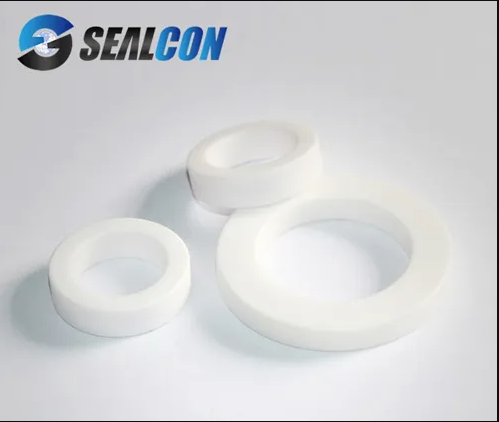Ceramic Seal

Produktbeskrivelse
Ceramic material refers to inorganic non-metallic materials made of natural or synthetic compounds through forming and sintering. It has the advantages of high melting point, high hardness, high wear resistance and oxidation resistance. Ceramic mechanical seal is widely used in machinery, chemical industry, petroleum, pharmaceutical, automobile and other fields. Because of its advantages, ceramic shaft seal has become Sealcon’s great choice for sealing materials.
Ceramic Material Properties
High pressure mechanical seals has the high demands about sealing materials, so the ceramic is choosed to make ceramic mechanical seal because of its competitive features.
Mechanical characteristic
Ceramic material is the material with the best rigidity and highest hardness in engineering materials, and its hardness is mostly above 1500HV. Ceramics have high compressive strength, but low tensile strength, poor plasticity and toughness. Ceramic seals perfectly inherit these characteristics.
Thermal characteristic
Ceramic materials generally have high melting point (mostly above 2000), and have excellent chemical stability at high temperature. The thermal conductivity of ceramics is lower than that of metal materials. At the same time, the linear expansion coefficient of ceramics is lower than that of metal. When temperature changes, ceramics have good dimensional stability.
Electrical characteristic
Most ceramics have good electrical insulation, so a large amount of insulation is used to make all kinds of voltages (1kV~110kV). Ferroelectric ceramics barium titanate (BaTiO3) has high dielectric constant which can be used in the production of capacitor, ferroelectric ceramics. A few ceramics also have the characteristic of semiconductor, can be a rectifier.
Chemical characteristic
Ceramic material is not easy to be oxidized at high temperature, and has good corrosion resistance to acid, alkali and salt.
Optical characteristic
Ceramic materials also have unique optical properties, which can be used as solid laser materials, optical fiber materials, optical storage containers, etc. Transparent ceramics can be used in high-pressure sodium lamp tubes. Magnetic ceramics (ferrites such as MgFe2O4, CuFe2O4, Fe3O4) have a wide range of applications in recording tapes, records, transformer cores, and large computer memory components.
Ceramic Material Properties
Mechanical seals has the high demands about sealing materials, so the ceramic is choosed to make ceramic mechanical seal because of its competitive features.
Mechanical characteristic
Ceramic material is the material with the best rigidity and highest hardness in engineering materials, and its hardness is mostly above 1500HV. Ceramics have high compressive strength, but low tensile strength, poor plasticity and toughness. Ceramic seals perfectly inherit these characteristics.
Thermal characteristic
Ceramic materials generally have high melting point (mostly above 2000), and have excellent chemical stability at high temperature. The thermal conductivity of ceramics is lower than that of metal materials. At the same time, the linear expansion coefficient of ceramics is lower than that of metal. When temperature changes, ceramics have good dimensional stability.
Electrical characteristic
Most ceramics have good electrical insulation, so a large amount of insulation is used to make all kinds of voltages (1kV~110kV). Ferroelectric ceramics barium titanate (BaTiO3) has high dielectric constant which can be used in the production of capacitor, ferroelectric ceramics. A few ceramics also have the characteristic of semiconductor, can be a rectifier.
Chemical characteristic
Ceramic material is not easy to be oxidized at high temperature, and has good corrosion resistance to acid, alkali and salt.

